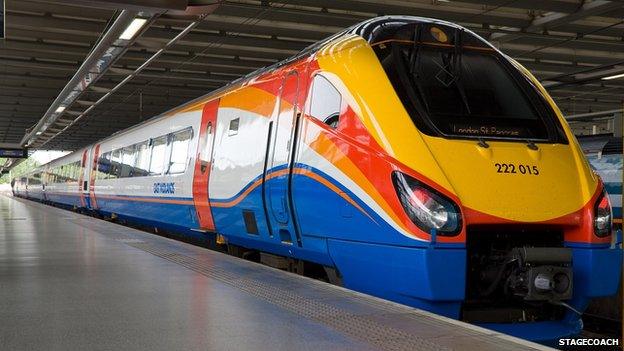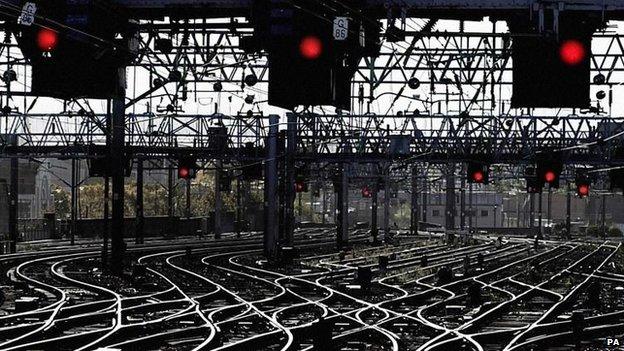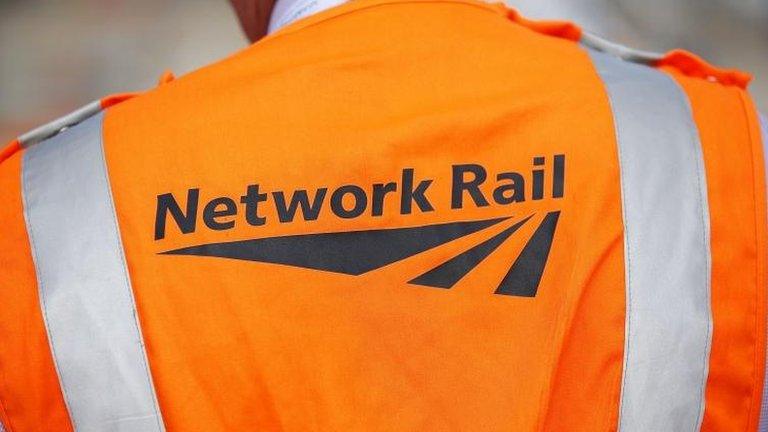All bets off for £38bn rail plan
- Published
- comments
Mark Carne, Network Rail CEO: "A lot of those targets just aren't achievable"
It was launched with much fanfare in April last year - a £38bn plan to bring Britain's railways kicking and screaming into the 21st Century.
The "largest modernisation of the railways since Victorian times" was at the heart of the government's long term economic plan.
Well, today all bets are off as to how much of the ambitious plan will be delivered. And when.
The chief executive of Network Rail, Mark Carne, has told the BBC the challenges of delivering myriad improvement projects - such as the electrification of the Great Western line to South Wales, improved punctuality for millions of passengers and the renewal of hundreds of miles of track - whilst still running a railway seven days a week were simply overwhelming.
Some of the projects will be delayed. And costs will rise.
"Over the last year it has become obvious that the challenges of operating, maintaining and enhancing the railway are significant," Mr Carne told me.
"I think it's time to level with the public and say that some of these extraordinary projects that we absolutely need are going to take longer and are going to cost more than we originally thought.
"We are going to take the summer to re-evaluate the extension of the programme - we need to do that properly with the Department for Transport and, of course, looking at the impact on trains as well.
"On cost - until we know the exact pattern of the service we will be delivering, we cannot estimate the final cost."
As part of the announcement today, the chairman of Network Rail, Richard Parry-Jones, will leave after his three-year term.
Sir Peter Hendy, the head of Transport for London and the man who "delivered" the Olympic transport plan for the capital, will take his place.

Electrification work on the Midland mainline will be "paused"
It's all a long way from the words of Patrick McLoughlin, the Transport Secretary, who said at the launch of the five-year plan: "A key part of this government's long term economic plan is investing in world class infrastructure.
"That is why we are putting record amounts of government funding into our railways over the next five years.
"That investment will generate growth, create jobs and boost business while delivering faster journeys, greater comfort and better punctuality for passengers across the UK."
To be clear, much of the investment will still happen. It will just be slower and more expensive.
And significant Whitehall sources have also told me that spending £38bn over five years is still the plan.
Which means that, according to those officials, the Conservative Party is not about to break its manifesto pledge to spend that amount.
What does appear to be the case - according to senior people in the rail industry - is that the Department for Transport was warned last spring that the five-year plan was at risk.
But the government has waited until after the election before announcing the change.
Mr McLoughlin said that electrification of the Great Western Line was a "top priority", but added that electrification work would be "paused" on the Midland mainline and on the Transpennine route.

Mr Carne, who became chief executive of Network Rail last February when the five-year plan had already been agreed, said that the difficulties of improving Britain's railways had been underestimated.
Much of Britain's railway network harks from the Victorian era, and on the Great Western Railway, for example, many of the bridges and tunnels that need to be upgraded to allow for electrification are listed.
Wholesale shutdowns of routes are not much welcomed by passengers and so engineers have to cram in the work overnight.
That can lead to over-runs. And when that happens, as it did at King's Cross at Christmas (and you can read about that shambles here), Network Rail gets it in the neck.
Quite rightly, say Network Rail's critics who point out that the organisation is already miles behind on delivering targets such as improving signalling and track renewal.

Mr Carne insists he wants a new approach, working with the regulator and the government to deliver a realistic plan.
"The railway as a whole is not meeting the demands that customers put on it," he said.
"I'm working relentlessly with my team to improve the infrastructure.
"It's important to note that the railway itself is the most reliable it has ever been but because we have so many more passengers using the railway we are at a choke point in some parts of the railway, which is affecting performance.
"There are going to be some projects that we will identify during the summer where there will be some delay - and that's partly because of cost and partly because of industry capacity
"It was a very ambitious plan.
"I think people went into it in the right frame of mind, but over the last year experience has shown that a lot of those targets aren't achievable.
"And rather than beating ourselves up over some rather arbitrary target I think we should level with people and reset expectations around what we can deliver
"Our railway is a great success story, passenger numbers have doubled in the last 20 years - but it's a huge challenge to transform the performance of our railway while still providing a great service to the four and half million people that use our railway every day."